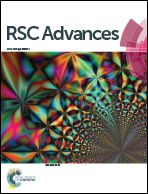Hydrogen influence on generalized stacking fault energies of Zr {0001} basal plane: a first-principles study
Abstract
The influence of hydrogen on the Generalized Stacking Fault (GSF) energies of the {0001} basal plane along the 〈10![[1 with combining macron]](https://www.rsc.org/images/entities/char_0031_0304.gif) 0〉 and 〈11
0〉 and 〈11![[2 with combining macron]](https://www.rsc.org/images/entities/char_0032_0304.gif) 0〉 directions in HCP Zr has been investigated by using the first-principles calculations. The variations of GSF energies are studied with respect to different distances of H atoms away from the glide plane and different hydrogen concentrations around the glide plane. The results have shown that the ⅓〈10
0〉 directions in HCP Zr has been investigated by using the first-principles calculations. The variations of GSF energies are studied with respect to different distances of H atoms away from the glide plane and different hydrogen concentrations around the glide plane. The results have shown that the ⅓〈10![[1 with combining macron]](https://www.rsc.org/images/entities/char_0031_0304.gif) 0〉{0001} GSF energy is drastically reduced when H atoms are located nearby the glide plane, but H atoms only moderately decrease the ⅓〈11
0〉{0001} GSF energy is drastically reduced when H atoms are located nearby the glide plane, but H atoms only moderately decrease the ⅓〈11![[2 with combining macron]](https://www.rsc.org/images/entities/char_0032_0304.gif) 0〉{0001} GSF energy in proportion. With the increase of H concentration around the glide plane, the GSF energies further greatly reduce with respect to both shift directions. The physical origins of the reduction of GSF energies caused by H atoms have been interpreted based on Bader charge analysis and the structural deformation around the glide plane. The Coulomb repulsion of the positively charged Zr atoms on both sides of the glide plane results in a remarkable decrease of the ⅓〈10
0〉{0001} GSF energy in proportion. With the increase of H concentration around the glide plane, the GSF energies further greatly reduce with respect to both shift directions. The physical origins of the reduction of GSF energies caused by H atoms have been interpreted based on Bader charge analysis and the structural deformation around the glide plane. The Coulomb repulsion of the positively charged Zr atoms on both sides of the glide plane results in a remarkable decrease of the ⅓〈10![[1 with combining macron]](https://www.rsc.org/images/entities/char_0031_0304.gif) 0〉{0001} GSF energy, while the relatively large structural deformation takes precedence over the Coulomb repulsion to determine the ⅓〈11
0〉{0001} GSF energy, while the relatively large structural deformation takes precedence over the Coulomb repulsion to determine the ⅓〈11![[2 with combining macron]](https://www.rsc.org/images/entities/char_0032_0304.gif) 0〉{0001} GSF energy in the presence of H atoms. Our work proposes a new insight to understand the role of H in the degradation of Zr mechanical performance as cladding materials of nuclear reactors.
0〉{0001} GSF energy in the presence of H atoms. Our work proposes a new insight to understand the role of H in the degradation of Zr mechanical performance as cladding materials of nuclear reactors.


 Please wait while we load your content...
Please wait while we load your content...